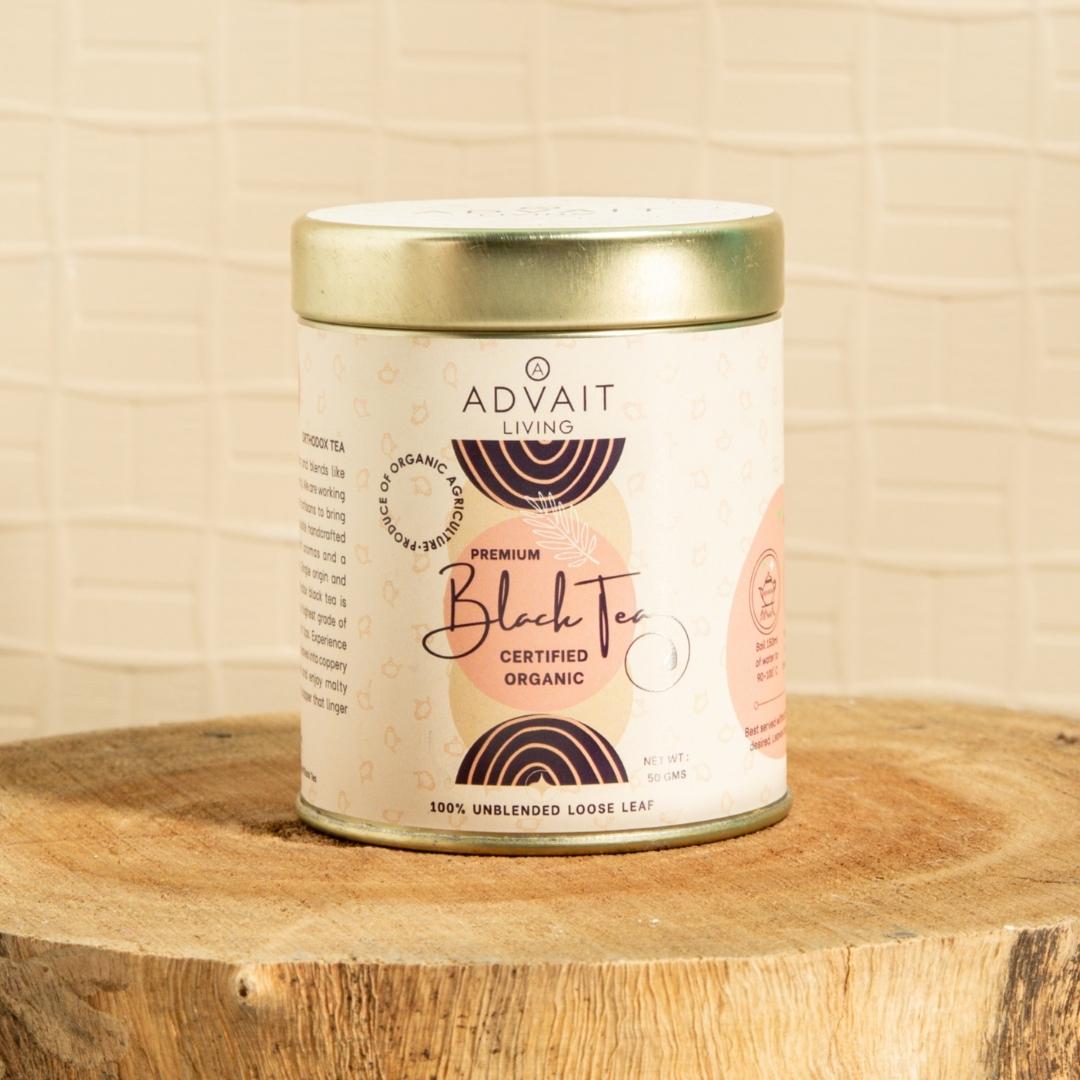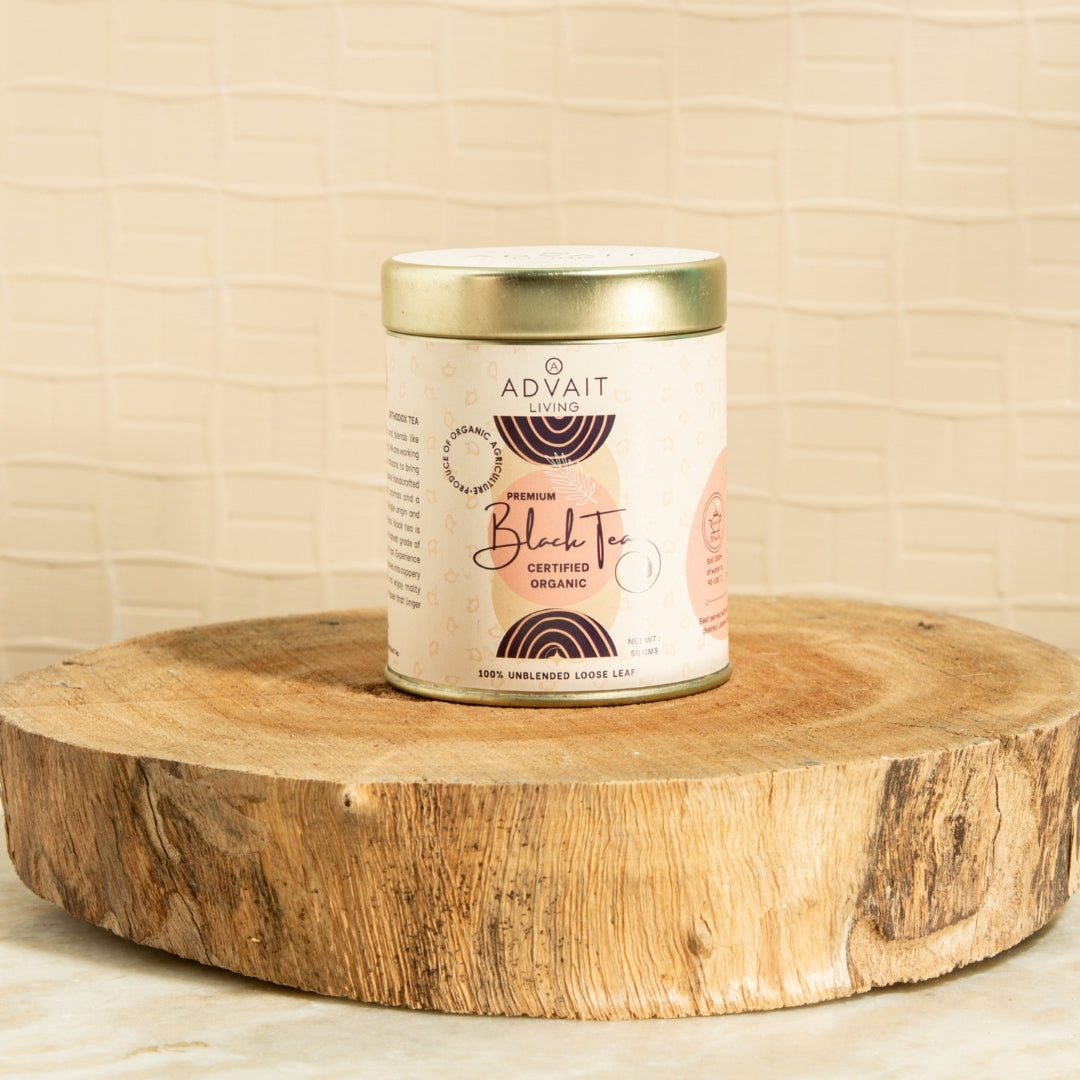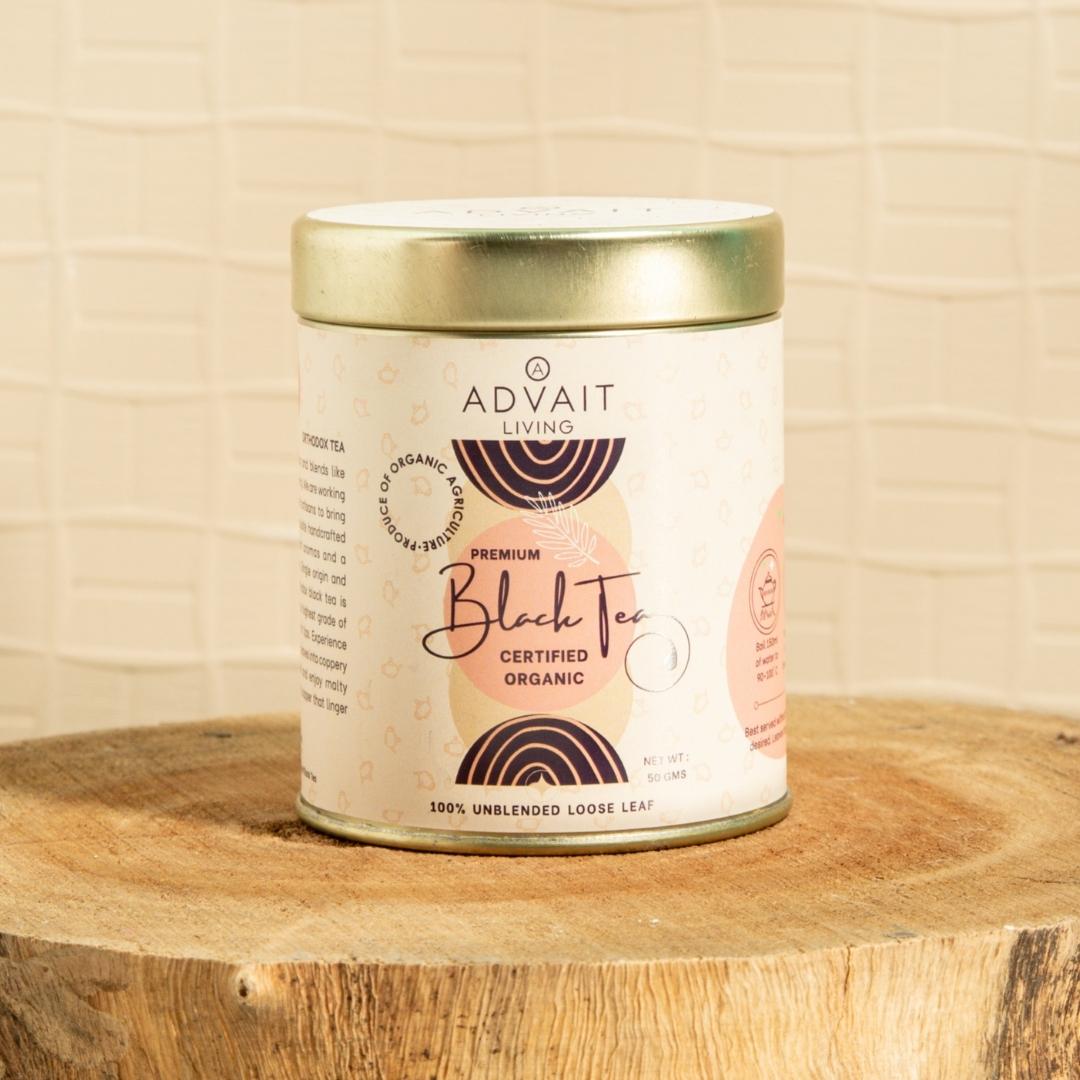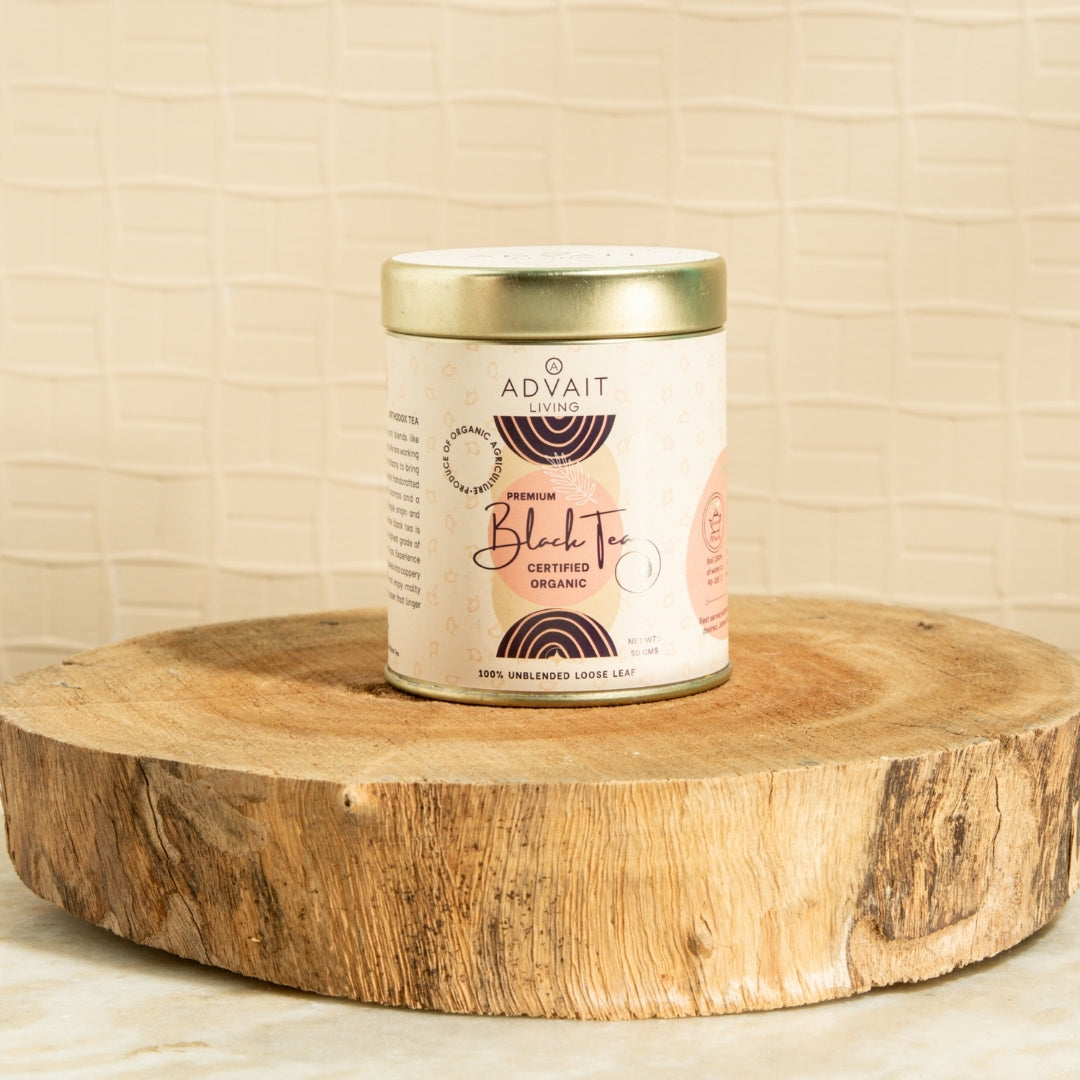Advait Living
Black Tea | 50 g | Certified Organic | Single-Estate Origin | Premium Loose Leaf
Black Tea | 50 g | Certified Organic | Single-Estate Origin | Premium Loose Leaf
Couldn't load pickup availability
 Certified Organic
Certified Organic
 100% Unblended
100% Unblended
 Premium Quality
Premium Quality
 Assam Tea
Assam Tea
 Handcrafted
Handcrafted
 Rich in Antioxidants
Rich in Antioxidants
Offers
- Avail 5% Discount on orders above Rs 1500. Use Code - ADVAIT5
- Avail 5% Discount & Free Shipping on orders above Rs 2500. Use Code - GOODFOOD
With each precious and traditional cup, experience the pure joy of Advait Living’s Premium Black Tea. Incredibly rich in flavour and aroma, offering a unique and authentic tea experience.
Key Features of Advait Living Premium Black Tea:
- Single-Estate Origin: Our orthodox black tea comes from small farmers near Golaghat, Assam, close to the famous Kaziranga National Park. These dedicated local farmers have perfected the art of tea cultivation, ensuring each leaf embodies the rich flavours of the region.
- Unblended: Our black tea is a single-estate, unblended tea, surpassing generic teas in both purity and flavour.
- High-Grade Loose Leaves: Crafted from the finest ‘tippy golden flowery orange pekoe’ leaves, our tea features long leaves that unfurl gracefully into coppery brown hues when infused. These leaves release malty, flavourful notes of nuts and copper that linger on the palate, offering an unmatched sensory delight.
- Certified Organic: Grown on family-owned land, our partner farmer has practised organic agriculture for many years and is certified organic, ensuring our tea leaves are free from chemicals and pesticides.
- Handcrafted: Our black tea is made by hand, with each leaf meticulously plucked and hand rolled to preserve its natural essence. This dedication to traditional methods ensures a bold, exquisite, and minimally processed tea, embodying full natural flavours and nutrients.
- Bold Flavour: The robust, malty flavours combined with subtle notes of nuts and copper provide a full-bodied, lingering taste that will keep you refreshed throughout the day.
Indulge in this authentic, handcrafted tea and savour its luxurious flavour and aroma!


The quality of this tea is very good. The leaves are very long and actually unroll into much bigger leaves once brewed. I liked the tea taste as well.
Swasti Chavan
I have been consuming many of Advait's products and every time I am pleasantly surprised by the excellent quality the team brings forth!! This black tea is a find. It's great in taste and the leaves are almost an inch long. You can taste the handcrafted goodness! Do try it.
Priti Patil
Excellent aroma, premium quality leaves, and brews really well. I brew longer for 3-5 mins at least to get much stronger notes from this Tea and it never disappoints!! Highly recommend it.
Darshani Kaur
More Info
Get in-depth insights on our products! Learn more about what makes them special, how they are made, how to use them and more.

Description
Advait Living Premium Black Tea
Our Premium Black Tea offers an unparalleled blend of luxury, purity, richness, and authenticity. Crafted with care, this tea is a testament to traditional methods and exceptional quality.
1. Single-Origin and Organic:
Sourced from a single estate near Golaghat, Assam, our tea comes from the lush, fertile landscapes close to Kaziranga. Our partner farmers practice organic agriculture on certified organic farms, ensuring our tea leaves are free from chemicals and pesticides.
2. Highest Grade Leaves:
Made by hand using ‘tippy golden flowery orange pekoe’ leaves, which are the highest grade, our black tea boasts an abundance of tips. These leaves unfurl into beautiful coppery brown hues when infused, releasing malty, flavourful notes of nuts and copper that linger on the palate.
3. Handcrafted Excellence:
Traditional methods and skilled artisans ensure that our black tea surpasses generic teas in both purity and flavour. Each batch is meticulously monitored for quality, ensuring only the finest leaves make it into your cup.
4. Support for Local Farmers:
By sourcing directly from small farmers near Golaghat, we promote fair trade practices and provide market access to local farming communities. This not only ensures the best quality tea but also supports the livelihoods of these dedicated farmers.
Health Benefits of Drinking Advait Living Black Tea:
- Rich Flavour and Aroma: Authentic taste with a rich, malty flavour.
- Antioxidant-Rich: Packed with antioxidants that help reduce cell damage.
- Improved Alertness: Contains naturally occurring L-theanine, an amino acid that enhances alertness.
- Dental Health: Contains natural fluoride that promotes good dental hygiene.
How to Make the Perfect Cup?
- Heat 1 cup of water in a teapot. Boil it for a minute and then switch off the flame.
- Add a teaspoon (2 gms) of our organic loose leaf black tea.
- Steep for about 5 minutes.
- Strain the tea.
- Add raw honey (optional) and stir well.
- Enjoy your hot cup of goodness.
Adjust the amount of tea leaves to make your tea light or strong.
Indulge in the exquisite taste and myriad health benefits of Advait Living Premium Black Tea, and elevate your tea-drinking experience to new heights!
Making Process
The Making Process of Advait Living Orthodox Loose Leaf Black Tea
At Advait Living, the creation of our Premium Black Tea is a journey that honors tradition, nature, and craftsmanship. Here’s an in-depth look into the intricate process that transforms the finest 'tippy golden flowery orange pekoe' leaves into a cup of pure joy:
1. Growing:
Our black tea begins its journey in the lush, fertile fields of Assam, near Golaghat and the renowned Kaziranga National Park. Here, small local farmers, who have honed their skills over generations, cultivate the tea plants organically. The region's unique climate and soil conditions contribute to the exceptional quality of the leaves.
2. Plucking:
Manual picking ensures high-quality tea and relies heavily on the skill of the picker. Our black tea is crafted from the finest 'tippy golden flowery orange pekoe' leaves, known for their abundance of tips. These leaves are carefully harvested to capture the peak of their flavour and aroma.
3. Withering:
The freshly picked tea leaves are spread out in very thin layers on bamboo racks to reduce moisture content. These are dried in natural air under shade for a minimum of 20 to 24 hours, ensuring the leaves maintain their delicate structure and begin developing their rich flavour.
4. Oxidation:
To develop the distinct malty flavour and deep coppery hues, the withered leaves undergo controlled oxidation. This step is crucial as it transforms the leaves' natural compounds, enriching their flavour profile and giving the tea its characteristic boldness.
5. Rolling:
The leaves are then rolled by hand, a delicate process that twists them into their characteristic shapes. This rolling not only shapes the leaves but also helps release the natural oils, enhancing the flavour and aroma of the tea.
6. Drying:
The leaves undergo a drying process to remove any remaining moisture. This ensures that the leaves are crisp and ready for packaging, preserving their quality and extending their shelf life. The drying process also locks in the distinctive malty flavour and aroma that our black tea is known for.
7. Sorting and Grading:
Once dried, the leaves are meticulously sorted and graded. Only the finest leaves that meet our stringent quality standards make it into our premium product. This careful grading ensures consistency in every batch, so you get the same exceptional experience with each cup.
8. Packaging:
The final step is the packaging of the tea leaves. We use eco-friendly, airtight, food-grade tin containers to ensure that the leaves retain their freshness, flavour, and aroma until they reach your cup.
Commitment to Quality and Sustainability:
Throughout the entire process, from handpicking to packaging, we adhere to the highest standards of quality and sustainability. Our commitment to organic farming practices means that no harmful chemicals or pesticides are used at any stage. By supporting local farmers and using sustainable methods, we ensure that our tea is not only good for you but also for the environment.
Ingredients
100% whole leaf black tea
Shipping
Sustainable Packaging: Our black tea leaves are elegantly packed in high-quality tin containers. This eco-friendly packaging ensures the preservation of purity, with the added bonus of being reusable. Some outstation orders may include plastic wrap for efficient shipping. We encourage you to reuse or return our packaging, reinforcing our dedication to a greener, healthier planet.
How To Use?
Brewing the Perfect Cup!
1. Heat the Water:
Heat 1 cup (150ml - 200ml) of filtered water. Bring it to a boil, then turn off the flame.
2. Measure the Tea Leaves:
Add a teaspoon (2 gms) of Advait Living's organic black loose leaf tea in a kettle.
3. Steep:
Pour the hot water over the tea (and not the other way around of adding leaves to the water). Allow the tea to steep for about 2-4 minutes. This allows the leaves to unfurl and release their rich flavours and aromas.
4. Strain:
Strain the tea into your teacup and enjoy. You can reuse the tea leaves and brew them for up to 2-3 cycles. Simply add additional hot water to your kettle and brew the leaves again for a fresh cup of tea.
5. Sweeten (Optional):
Add raw honey to your tea, if you prefer a sweeter version, and stir well for a classic taste. Sip and enjoy your hot cup of goodness, savouring the malty, flavourful notes of nuts and copper that linger on the palate.
Adjusting the Strength:
- Lighter Brew: Use fewer tea leaves or steep for a shorter time.
- Stronger Brew: Use more tea leaves or steep for a longer time.
Pro Tips:
- Use freshly boiled water to ensure the best extraction of flavours.
- Pre-warm your teapot and cup by rinsing them with hot water to maintain the optimal brewing temperature.
- Experiment with the steeping time and amount of leaves to find your perfect cup.
FAQ
Have questions? We've got answers! Check out our Frequently Asked Questions section for all the info you need. Find solutions, tips, and more to make your experience smoother.

What is black tea good for?
Black tea contains less caffeine than coffee and is an easy non-caloric refreshing drink. Furthermore, it also provides several health benefits:
10 Health Benefits of Black Tea:
1. Rich in Antioxidants:
Black tea contains polyphenols, which help combat free radicals and reduce oxidative stress, promoting overall cellular health.
2. Improves Heart Health:
Regular consumption can help reduce blood pressure, lower cholesterol levels, and decrease the risk of heart disease.
3. Boosts Mental Alertness:
The caffeine and L-theanine in black tea improve focus and concentration, enhancing cognitive function and mental alertness.
4. Supports Digestive Health:
Black tea has anti-inflammatory properties that can help maintain a healthy digestive tract and support overall gut health.
5. Promotes Good Oral Health:
The natural fluoride and tannins in black tea help reduce plaque buildup and prevent cavities, promoting better dental hygiene.
6. Aids in Weight Management:
The compounds in black tea may boost metabolism and aid in fat burning, supporting weight management efforts.
7. May Reduce Cancer Risk:
The antioxidants and polyphenols in black tea have been shown to have potential cancer-preventive properties.
8. Regulates Blood Sugar Levels:
Black tea (when consumed without sugar) can improve insulin sensitivity, helping to regulate blood sugar levels and reduce the risk of type 2 diabetes.
9. Enhances Immune Function:
The alkylamines in black tea boost the immune response, helping the body fend off infections and illnesses.
10. Promotes Relaxation and Reduces Stress:
L-theanine in black tea helps promote relaxation and reduce stress, providing a calming effect while maintaining alertness.
Can I drink black tea every day?
Yes, you can drink black tea every day. Drinking black tea daily can offer several health benefits, but it's important to consume it in moderation.
Considerations:
1. Caffeine Content: While moderate caffeine intake is beneficial, excessive consumption can lead to insomnia, increased heart rate, and anxiety. Limit your intake to 3-4 cups per day to avoid these issues.
2. Iron Absorption: Black tea contains tannins that can interfere with iron absorption. If you have iron deficiency or are at risk, drink tea between meals rather than with meals.
3. Additives: Be mindful of added sugars or sweeteners, as they can negate some health benefits.
Tips for Enjoying Black Tea Daily:
- Balance: Keep your tea consumption within recommended limits.
- Variety: Enjoy different types of black tea to avoid flavour fatigue.
- Hydration: Ensure you drink enough water throughout the day, as black tea contains caffeine, which can have a mild diuretic effect.
By keeping these points in mind, you can safely enjoy the many benefits of black tea as part of your daily routine.
Which is better, green tea or black tea?
The choice between green tea and black tea depends on personal preference and specific health goals, as both types of tea offer unique benefits.
Here’s a comparison of their health benefits to help you decide which might be better for you:
- Antioxidants: Black tea is rich in polyphenols and theaflavins, while green tea is high in catechins, especially EGCG.
- Weight Loss: Black tea boosts metabolism and aids fat burning, while green tea enhances fat burning and boosts metabolism.
- Heart Health: Black tea lowers blood pressure and cholesterol levels, whereas green tea lowers LDL cholesterol and improves artery function.
- Mental Alertness: Black tea has a higher caffeine content for better alertness and concentration, while green tea provides moderate caffeine and L-theanine for a calm yet alert mental state.
- Digestive Health: Black tea's anti-inflammatory properties support gut health, while green tea's anti-inflammatory properties aid digestion.
- Oral Health: Black tea's natural fluoride and tannins reduce plaque and cavities, and green tea's catechins improve oral health and reduce bad breath.
- Immune Support: Compounds in black tea boost immune function, and green tea's antioxidants and polyphenols support immune health.
- Cancer Prevention: Black tea's antioxidants may reduce cancer risk, while green tea's high antioxidant content may protect against certain cancers.
- Anti-Inflammatory: Both black tea and green tea have anti-inflammatory properties.
- Brain Function: Black tea improves focus and cognitive abilities, whereas green tea enhances brain function and improves focus and cognitive abilities.
Considerations:
- Caffeine Content: Green tea has less caffeine than black tea, which might be preferable for those sensitive to caffeine. Black tea can be beneficial for those needing an energy boost but may not be suitable for those sensitive to caffeine.
- Flavour: Green tea has a more delicate, sometimes grassy flavour, which may not appeal to everyone. Whereas, black tea has a stronger, bolder flavour, which many people find satisfying.
Which is Better?
- For Antioxidants and Weight Loss: Green tea is generally better due to its higher catechin content and metabolism-boosting properties.
- For Mental Alertness and Digestive Health: Black tea might be the preferred choice due to its higher caffeine content and digestive benefits.
- For Flavour Preferences: Choose based on whether you prefer the delicate taste of green tea or the robust flavour of black tea.
Ultimately, both teas offer significant health benefits, and the best choice depends on your individual health goals and taste preferences. You might even consider incorporating both alternatively for a variety of benefits.
What is called black tea?
Black tea is a type of tea that is more oxidized than other types, such as green, white, or oolong tea. It is made from the leaves of the Camellia sinensis plant, which undergoes withering, rolling, oxidation, and drying processes. The oxidation process gives black tea its characteristic dark colour, robust flavour, and higher caffeine content compared to other types of tea.
Why is green tea more expensive than black tea?
There are several factors that can contribute to green tea being more expensive than black tea:
1. Processing Method: Green tea undergoes minimal processing compared to black tea. It is typically steamed or pan-fired to halt oxidation, preserving its natural flavour and antioxidants. This process requires more attention to detail and can be more labour-intensive, leading to higher production costs.
2. Harvesting Time: Green tea is often harvested earlier in the growing season when the leaves are young and tender, which can require more careful handpicking and result in lower yields compared to the larger, mature leaves used for black tea.
3. Quality and Grade: Premium green teas are often made from specific varieties of tea plants and harvested from specific regions known for producing high-quality tea. The meticulous cultivation, harvesting, and processing of these teas contribute to their higher price.
4. Health Benefits: Green tea is renowned for its health benefits and antioxidant properties, which can drive up demand and prices.
5. Cultural Significance: In some cultures, such as Japan and China, green tea holds special cultural significance and is deeply ingrained in traditions and ceremonies, leading to higher demand and prices.
Is black tea good for weight loss?
Black tea can potentially support weight loss efforts, although it is essential to note that black tea alone is not a guaranteed solution for weight loss. It should be consumed as part of a balanced diet and healthy lifestyle, which includes regular physical activity and mindful eating habits.
Here's how black tea may contribute to weight loss:
- Boosts Metabolism: Black tea contains caffeine, which is a natural stimulant that can increase metabolic rate and enhance fat burning. A higher metabolic rate means your body burns more calories, potentially aiding in weight loss.
- Increases Energy Expenditure: The caffeine in black tea can also increase energy expenditure, leading to more calories burned throughout the day, especially when combined with physical activity.
- Promotes Fat Oxidation: Some studies suggest that the compounds found in black tea, such as theaflavins and thearubigins, may help promote fat oxidation, which is the process of breaking down fat for energy.
- Suppresses Appetite: Caffeine can act as an appetite suppressant, helping to reduce feelings of hunger and decrease overall calorie intake, especially if consumed before meals.
- Hydration: Staying hydrated is essential for overall health and can support weight loss efforts by promoting feelings of fullness and preventing overeating. Black tea, when consumed without added sugar or milk, can contribute to daily fluid intake.
Also, excessive consumption of black tea, especially with added sugar or milk, can contribute to excess calorie intake and may hinder weight loss efforts. As always, it's essential to consult with a healthcare professional before making significant changes to your diet or lifestyle, especially if you have underlying health conditions.
Is black tea good for the skin?
Yes, black tea can be beneficial for the skin due to its antioxidant and anti-inflammatory properties.
Here's how black tea can contribute to skin health:
1. Antioxidant Protection:
- Black tea is rich in antioxidants, such as polyphenols, which help neutralize free radicals in the body.
- Free radicals are unstable molecules that can damage skin cells and contribute to premature ageing, including wrinkles, fine lines, and sagging skin.
- By neutralizing free radicals, antioxidants in black tea can help protect the skin from oxidative stress and maintain a youthful appearance.
2. UV Protection:
- Some studies suggest that the polyphenols in black tea may provide protection against the harmful effects of UV radiation from the sun.
- While not a replacement for sunscreen, incorporating black tea into your skincare routine may provide an additional layer of defence against sun damage and help prevent sunburns, photoaging, and skin cancer.
3. Anti-Inflammatory Effects:
- Black tea contains compounds with anti-inflammatory properties, which can help reduce redness, irritation, and inflammation in the skin.
- This can be particularly beneficial for individuals with sensitive or acne-prone skin, as it may help calm existing breakouts and prevent further inflammation.
4. Skin Brightening:
- The tannins present in black tea may help improve skin tone and complexion by tightening and toning the skin.
- Applying black tea topically or using skincare products containing black tea extract may help reduce the appearance of pores, minimize excess oil production, and promote a smoother, more radiant complexion.
5. Hydration:
- Drinking black tea can contribute to overall hydration, which is essential for maintaining healthy skin.
- Proper hydration helps keep the skin moisturized, supple, and resilient, reducing the risk of dryness, dullness, and irritation.
6. Anti-Ageing Effects:
- The catechins and theaflavins found in black tea may help stimulate collagen production and elastin synthesis in the skin, which are essential proteins for maintaining skin elasticity and firmness.
- This can help minimize the appearance of fine lines, wrinkles, and other signs of aging, promoting a more youthful-looking complexion.
Incorporating black tea into your skincare routine, both internally through consumption and externally through topical application, can help support skin health and promote a clear, radiant complexion. However, individual results may vary, and it's essential to consult with a dermatologist or skincare professional for personalized advice and recommendations tailored to your specific skin concerns.
Is black tea better than coffee?
Whether black tea is better than coffee depends on individual factors such as caffeine tolerance, health considerations, taste preferences, and lifestyle habits. Both beverages can be enjoyed as part of a balanced diet and lifestyle, and the choice between them is a matter of personal preference.
1. Caffeine Content:
- Black tea generally contains less caffeine than coffee. A typical cup of black tea contains about 30-70 mg of caffeine, while a cup of coffee can contain anywhere from 70-140 mg or more, depending on factors such as the brewing method and coffee bean variety.
- For individuals sensitive to caffeine or looking to reduce their caffeine intake, black tea may be a preferable option.
2. Antioxidants and Health Benefits:
Both black tea and coffee contain antioxidants, but they differ in their types and quantities.
- Black tea is rich in polyphenols, such as catechins and theaflavins, which have been linked to various health benefits, including heart health, improved cognitive function, and reduced risk of certain diseases.
- Coffee also contains antioxidants, such as chlorogenic acid and caffeic acid, which may offer health benefits, including improved brain function, enhanced athletic performance, and protection against certain chronic diseases.
3. Acidity and Digestive Sensitivity:
- Coffee is generally more acidic than black tea, which may contribute to digestive discomfort, acid reflux, or other gastrointestinal issues for some individuals.
- Black tea is considered to be less acidic and may be better tolerated by those with sensitive stomachs or acid reflux.
4. Taste and Flavour Profile:
The taste and flavour profile of black tea and coffee are distinct and can vary depending on factors such as origin, processing method, and brewing technique.
- Black tea typically has a smooth, rich flavour with malty, floral, or fruity notes, while coffee often has a bold, robust flavour with varying degrees of bitterness and acidity.
- Preference for taste and flavour is subjective and varies among individuals.
5. Cultural and Social Factors:
Coffee and black tea are deeply ingrained in various cultures and traditions around the world. The choice between the two beverages may be influenced by cultural preferences, social norms, and personal habits.
What is the shelf life of Advait Living Organic Black Tea?
The shelf life of Advait Living Organic Black Tea is 12 months.
What is the price of 50 gm Advait's Black Tea?
The price of 50 gms Advait Living Organic Black Tea is Rs 275.
Is black tea good hot or cold?
Whether black tea is enjoyed hot or cold is a matter of personal preference and can vary depending on the season, temperature, and occasion. Both hot and cold preparations of black tea offer unique sensory experiences and can be enjoyed for their distinct flavours, aromas, and textures.
Hot Black Tea:
- Hot black tea is a classic choice and is often enjoyed for its comforting warmth, especially during colder months or in the morning as a wake-up beverage.
- Steaming hot black tea can be soothing and relaxing, making it a popular choice for cozying up with a book or enjoying a quiet moment of reflection.
- Hot black tea is versatile and can be enjoyed plain or with additions such as milk, sugar, honey, lemon, or spices like cinnamon or ginger, depending on individual taste preferences.
Iced/Cold Black Tea:
- Cold black tea, also known as iced tea, is refreshing and hydrating, especially on hot summer days or as a cooling beverage during outdoor activities.
- Cold black tea can be prepared by brewing hot tea and allowing it to cool before pouring it over ice or refrigerating it until cold. Alternatively, cold brew methods can be used to steep black tea directly in cold water for a smoother, less bitter flavour.
Cold black tea can be enjoyed plain or flavoured with additions such as citrus slices, fresh herbs like mint or basil, or sweeteners like simple syrup or fruit juice to create customized iced tea beverages.
Can I drink black tea at night?
While black tea contains less caffeine than coffee, it still contains a moderate amount of caffeine, which can interfere with sleep if consumed too close to bedtime. Therefore, drinking black tea at night may not be advisable for everyone, especially those who are sensitive to caffeine or prone to sleep disturbances.
Caffeine is a stimulant that can increase alertness, disrupt sleep patterns, and delay the onset of sleep. Its effects can vary from person to person, with factors such as caffeine tolerance, metabolism, and individual sensitivity influencing how caffeine affects sleep.
If you are considering drinking black tea at night, here are some tips to minimize its potential impact on sleep:
1. Limit Consumption: Consider reducing your intake of black tea in the evening, especially in the hours leading up to bedtime. Opt for decaffeinated black tea or herbal teas that are naturally caffeine-free if you prefer a warm beverage before bed.
2. Monitor Timing: Avoid consuming black tea within a few hours of bedtime to allow time for the caffeine to metabolize and its stimulating effects to wear off. Aim to finish your last cup of black tea at least 4-6 hours before bedtime to minimize the risk of sleep disruption.
3. Stay Hydrated: Opt for water or caffeine-free herbal teas in the evening to stay hydrated without the stimulating effects of caffeine. Hydration is essential for overall health and can support relaxation and restful sleep.
4. Listen to Your Body: Pay attention to how your body responds to black tea consumption in the evening. If you notice that it interferes with your sleep or causes restlessness, consider reducing or eliminating your intake of black tea at night.
Is black tea with milk healthy?
Black tea with milk is a popular beverage enjoyed by many people around the world, especially in regions such as the United Kingdom and India. Whether black tea with milk is considered healthy depends on several factors, including individual dietary preferences, overall diet quality, and any specific health conditions or goals.
Here are some considerations regarding the healthfulness of black tea with milk:
1. Nutritional Content:
- Black tea itself is rich in antioxidants and may offer health benefits, including heart health support and improved cognitive function.
- Milk is a good source of calcium, protein, and essential nutrients like vitamin D and vitamin B12.
2. Potential Benefits:
- Adding milk to black tea can provide additional nutrients, especially calcium and protein, which are essential for bone health and muscle function.
- Some research suggests that consuming dairy products may have potential benefits for gut and metabolic health, although individual responses may vary.
3. Considerations:
- The addition of milk to black tea may increase the calorie and fat content of the beverage, depending on the type and amount of milk used. Whole milk, for example, contains more calories and saturated fat compared to skim or low-fat milk options.
- Some individuals may be lactose intolerant or have dairy allergies, in which case consuming black tea with milk may not be suitable.
- The caffeine content in black tea combined with the potential stimulating effects of milk proteins may affect individuals sensitive to caffeine, potentially interfering with sleep or causing digestive discomfort.
- Sweeteners or flavourings added to black tea with milk, such as sugar or syrups, can contribute to excess calorie intake and may have negative effects on overall health if consumed in large amounts.
4. Moderation and Balance:
As with any dietary choice, moderation and balance are key. Consider choosing lower-fat milk options or alternatives like almond milk, soy milk, or oat milk for a lower-calorie and potentially lower-fat beverage.
Whether black tea with milk is considered healthy depends on overall dietary patterns, and how it fits into a balanced lifestyle. It's essential to listen to your body, enjoy foods and beverages mindfully, and make choices that support your individual health and wellness goals.
What are the 5 benefits of drinking black tea?
5 potential benefits of drinking black tea:
- Antioxidant Properties: Black tea is rich in antioxidants, such as polyphenols and flavonoids, which help neutralize harmful free radicals in the body. Antioxidants may help reduce oxidative stress and inflammation, supporting overall health and reducing the risk of chronic diseases like heart disease and cancer.
- Heart Health: Regular consumption of black tea may be beneficial for heart health. Some studies suggest that the antioxidants found in black tea may help lower LDL cholesterol levels, improve artery function, and reduce the risk of cardiovascular diseases like heart attacks and strokes.
- Improved Digestive Health: Black tea contains tannins, which have been shown to have anti-inflammatory and antimicrobial properties that may help support digestive health. Drinking black tea in moderation may help promote healthy digestion, reduce inflammation in the digestive tract, and alleviate symptoms of gastrointestinal disorders like bloating and indigestion.
- Mental Alertness and Focus: Black tea contains caffeine, a natural stimulant that can help improve mental alertness, focus, and cognitive function. Consuming black tea may help increase attention span, enhance memory, and boost overall brain function, making it an ideal beverage for staying alert and productive throughout the day.
- Bone Health: Black tea is a good source of fluoride and flavonoids, which are beneficial for bone health. Regular consumption of black tea may help improve bone density, strengthen bones, and reduce the risk of osteoporosis, especially in older adults.
It's important to note that while black tea offers potential health benefits, individual responses may vary, and excessive consumption should be avoided, especially for individuals sensitive to caffeine. As with any dietary choice, moderation is key, and it's essential to incorporate a variety of nutrient-rich foods and beverages into a balanced diet for optimal health and wellness.
Can I drink black tea on an empty stomach?
Drinking black tea on an empty stomach is generally considered safe for most people, but it may cause discomfort or irritation in some individuals, particularly those who are sensitive to caffeine or prone to digestive issues.
4 Main Considerations to keep in mind when drinking black tea on an empty stomach:
1. Caffeine Sensitivity: Black tea contains caffeine, a natural stimulant that can increase stomach acid production and potentially lead to digestive discomfort, especially on an empty stomach. Individuals who are sensitive to caffeine may experience symptoms such as nausea, acid reflux, or heartburn when consuming black tea without food.
2. Digestive Sensitivity: Some individuals may be more prone to digestive issues, such as gastritis, ulcers, or irritable bowel syndrome (IBS), which can be exacerbated by consuming black tea on an empty stomach. The tannins in black tea may also contribute to stomach irritation in sensitive individuals.
3. Hydration: Drinking black tea on an empty stomach may contribute to dehydration, as caffeine is a diuretic that can increase urine production. It's essential to stay hydrated by drinking water alongside black tea, especially if consumed without food.
4. Individual Tolerance: Individual tolerance to black tea on an empty stomach can vary. Some people may tolerate it well and experience no adverse effects, while others may find it uncomfortable or unpleasant.
4 Tips to Minimise Discomfort While Drinking Black Tea on an Empty Stomach
If you choose to drink black tea on an empty stomach, consider the following tips to minimize potential discomfort:
- Limit your intake: Start with a small amount of black tea and gradually increase your intake to assess your tolerance.
- Pair with food: Consuming black tea with a small meal or snack can help buffer its effects on an empty stomach and reduce the risk of digestive discomfort.
- Stay hydrated: Drink plenty of water alongside black tea to stay hydrated and offset its diuretic effects.
- Listen to your body: Pay attention to how your body responds to black tea on an empty stomach. If you experience any discomfort or adverse effects, consider consuming it with food or avoiding it altogether.
Whether you can drink black tea on an empty stomach depends on your individual tolerance, preferences, and overall health status. If you have any concerns or experience persistent digestive issues, consult with a healthcare professional for personalized advice and recommendations.
Very good tea. You can brew it a couple of times, so one spoon can make 2-3 cups! Happy with this purchase!
I am a self-acclaimed Tea connoisseur and I must say this tea is genuinely great. The quality of the leaves is very good and the taste is strong black tea which keeps me going through the day.
I am not a Tea drinker at all. But strangely enough, when I tried this black tea, I was hooked! Its unlike your regular tea and very tasty. The brewing process is simple and you can easily get a cuppa tea with antioxidants brimming in it. Happy with the purchase
I really like tea, It is easy to make with hot water. The tea diffuses well into a darkish golden hue. The taste is strong as well.
The quality of this tea is very good. The leaves are very long and actually unroll into much bigger leaves once brewed. I liked the tea taste as well.
Blogs
View all-

Father’s Day Gifting Guide: For the Man Who Lov...
This Father’s Day, go beyond the usual shirts and gadgets. Give your dad something that feels personal, rooted, and refreshingly indulgent. Our assorted tea kits are tailor-made for every kind...
Father’s Day Gifting Guide: For the Man Who Lov...
This Father’s Day, go beyond the usual shirts and gadgets. Give your dad something that feels personal, rooted, and refreshingly indulgent. Our assorted tea kits are tailor-made for every kind...
-

12 Unique Corporate Gifts That Stand Out in a P...
Go beyond the generic and explore unique corporate gifting ideas that reflect care, sustainability, and brand values.
12 Unique Corporate Gifts That Stand Out in a P...
Go beyond the generic and explore unique corporate gifting ideas that reflect care, sustainability, and brand values.
-

12 Unique and Thoughtful Ideas to Build Your Ow...
Create meaningful gift hampers with our handpicked ideas that blend wellness, indulgence, and personal touch. Make your gift truly unforgettable and special.
12 Unique and Thoughtful Ideas to Build Your Ow...
Create meaningful gift hampers with our handpicked ideas that blend wellness, indulgence, and personal touch. Make your gift truly unforgettable and special.
-

2024 Gift Guide to 10 Amazing Luxury Diwali Gifts
Explore our 2023 Luxury Gift Guide for Diwali. Packed with unique gift ideas to help you choose just the perfect and festive gift this Diwali!
2024 Gift Guide to 10 Amazing Luxury Diwali Gifts
Explore our 2023 Luxury Gift Guide for Diwali. Packed with unique gift ideas to help you choose just the perfect and festive gift this Diwali!
Advait Living Premium Organic Black Tea Leaves
Experience the Essence of Authenticity with Advait Living's Premium Black Tea! Delight in the richness of handpicked 'tippy golden flowery orange pekoe' leaves from Assam and unlock a world of flavour and aroma with every sip.
Why Choose Advait Living's Premium Black Tea?
- Crafted with Care: Our black tea embodies the perfect blend of Indian heritage and exceptional quality. Sourced from the pristine farms near Golaghat in Assam, close to the iconic Kaziranga National Park, our black tea promises an unmatched tea-drinking experience.
- Pure and Organic: Advait Living's Premium Black Tea is a symbol of purity. We prioritize organic farming practices, ensuring our tea leaves are free from harmful chemicals and pesticides. Every cup of our black tea is a testament to our commitment to quality and authenticity.
- Handcrafted Excellence: Meticulously handpicked and handcrafted, our black tea is made from the highest grade 'tippy golden flowery orange pekoe' leaves. These leaves are known for their abundance of tips, ensuring a rich and flavorful cup every time.
- Small-Batch Production: Unlike mass-produced teas, our black tea is made in small batches to preserve its natural goodness and freshness. This ensures that each cup of tea delivers a pure and delightful experience.
Key Features of Advait Living Premium Black Tea:
- 100% whole leaf black tea
- Single estate, certified organic tea
- Handpicked and handcrafted with care
- Rich flavour with malty notes and captivating aroma
- Releases coppery brown hues upon brewing
Health Benefits of Drinking Black Tea:
- Antioxidant Powerhouse: Black tea is rich in antioxidants, helping to protect cells from damage and reduce the risk of chronic diseases.
- Boosts Energy and Focus: The caffeine content in black tea can enhance alertness, focus, and cognitive function.
- Supports Digestive Health: Black tea's tannins may aid digestion and promote gastrointestinal health.
- Heart Health: Regular consumption of black tea may improve heart health by reducing cholesterol levels and improving blood vessel function.
- Hydration: Enjoying black tea can contribute to daily hydration, supporting overall well-being.
How to Enjoy Advait Living Premium Black Tea?
1. Boil Water: Heat 150-200ml of filtered water to 200°F to 212°F (95°C to 100°C).
2. Steep the Leaves: Add one teaspoon (2gms) of tea leaves per cup and steep for 3-5 minutes.
3. Savour: Pour into your favourite cup and enjoy the delightful aroma and flavour of your premium black tea.
Embrace the Essence of Purity and Flavor with Advait Living Premium Black Tea!
Sustainable Packaging: Our premium black tea comes in 50 gms packaging, housed in eco-friendly tin containers that can be washed and reused for kitchen purposes.
Price and Availability: Indulge in the purity and authenticity of Advait Living's Premium Black Tea at an affordable price of Rs. 275 for 50 gms.
How to Order Advait Living Premium Black Tea? Order online via our website www.advaitliving.com or WhatsApp your order to us at +91 9084894625. Enjoy Free Shipping on all orders above Rs. 2500. (Discounts and offers are at the discretion of the company and may change at any time).












